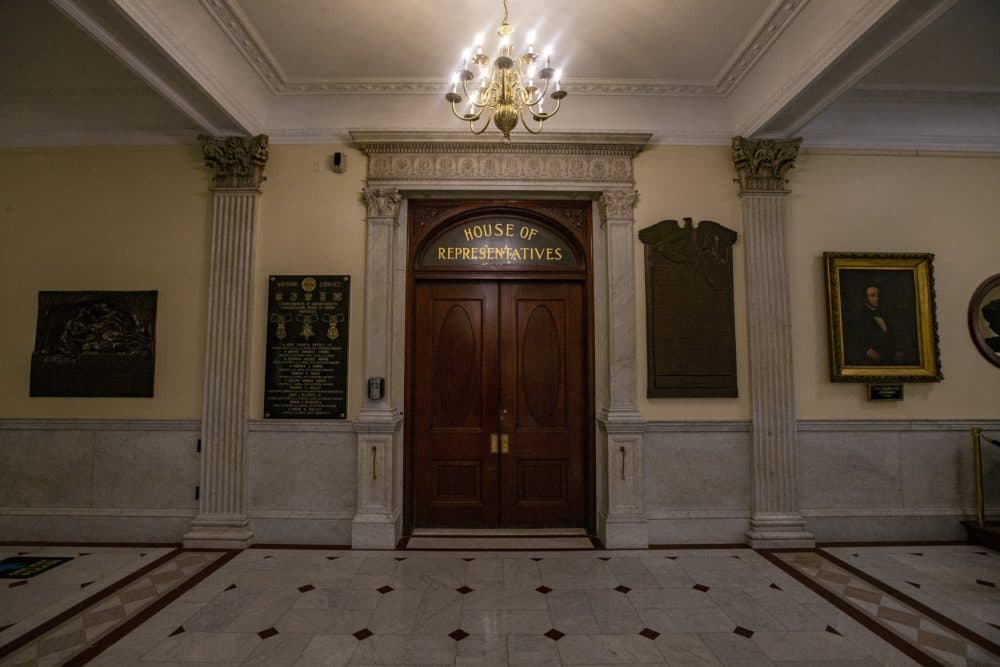Advertisement
Mass. House committee votes are secret. What to know about a ballot question trying to change that

In the November election, Massachusetts voters in 20 House districts will tell their representatives whether or not they want lawmakers' committee votes to be made public.
These legislative committee votes, often taken electronically and with no public notice, can either move bills forward in the lawmaking process, or lead to a dead end on Beacon Hill. A yes vote on this non-binding question would indicate voters want their representatives in the House to change the rules next session to make votes in committee publicly available on the Legislature's website.
Here's what you need to know:
Who are the stakeholders?
Advocacy group Act on Mass has led the campaign to include this question on the ballot in certain districts. Massachusetts is largely considered one of the most opaque governments in the country — it's the only state in which the Legislature, courts, and governor's office all claim to be exempt from public records laws. This ballot question is part of the nonprofit's long-term strategy to change that.
Democratic leadership of the House has long been hesitant to expand transparency in their work. Currently, the House provides only the names of lawmakers who voted "no" in committee, with an anonymized total of affirmative and withheld votes. Some suggest that making legislators' work more public would provide fodder to political opponents during campaigns.
Will I be able to vote on this issue in my district?
Voters in 20 out of 160 House districts will see the transparency question on the ballot, according to Act on Mass. Check this list to see if the question will appear on your ballot.
Since the ballot question is non-binding, what changes can we expect?
The ballot question is designed to pressure lawmakers to change the rules for the new session, and also to bolster the representatives who want to support transparency measures.
Several of the districts that will see the question are currently represented by members of House leadership, including Speaker Ron Mariano and Second Assistant Majority Leader Sarah Peake.
Affirmative votes on this ballot question "can be a really great excuse for them to do the right thing if they're up against the speaker or House leadership or their colleagues who don't want them to vote for this amendment," Erin Leahy, executive director of Act on Mass, told the State House News Service. "Having this in their back pocket is kind of a shield."
However, she emphasizes that it is part of a long-term battle for the nonprofit.
Advocates pushed similar non-binding questions in 16 House districts in 2020, all of which passed with an average of 90% voter support, according to Act on Mass.
However, that did not make much of a difference this session. The House rejected an amendment that would have made all committee vote details public, in addition to transparency measures such as requiring one week of notice ahead of committee hearings and making all public testimony on legislation available upon request.
Why isn't this ballot question binding?
There are a number of questions that can be added to a ballot, with different purposes and thresholds for inclusion.
Non-binding ballot questions, or public policy questions, like this one, are presented to voters in a specific district, and allows them to give instructions to their local state senator or representative. They require 200 signatures per House district, and 1,600 in Senate districts, to be added to the ballot.
A binding initiative petition would give voters a chance to change policy themselves, but would require following a lengthy process and collecting more than 80,000 signatures.
Even if Act on Mass had the capacity to launch a coalition, such as the effort behind the income tax amendment, Leahy says it's complicated. Since the Massachusetts constitution gives the Legislature the right to determine its own rules, Leahy says a binding vote to change the rules could bring up legal questions or require a constitutional amendment.
Why does this question only address the House, not the Senate?
Unlike the House, the Senate rules include a requirement that "all recorded votes of each member and by the committees" be published online. However, the chamber has still drawn criticism over transparency practices, including recently when it passed the sports betting legalization bill on a voice vote that did not record each senator's position.
At the beginning of the current session, the branches had an opportunity to implement new transparency measures to to govern joint committees, but could not come to an agreement. Existing rules do not require joint committees to publish any vote breakdown, although some may still volunteer the information.
With reporting by State House News Service's Chris Lisinski.
